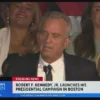Speaking before the first meeting of the Beyond Apology Commission meeting at City Hall on Friday, Mayor G.T. Bynum encouraged Tulsans to keep an open mind about the process and to participate in it.
The commission is charged with making recommendations for possible reparations for those harmed in the 1921 Tulsa Race Massacre and in the years after.
“The best way for us to determine the path forward for the city of Tulsa is to have Tulsans work together to talk through those different options for us as a community,” Bynum said. “We are at our best as a city when we are engaging in that dialogue, not just when we’re assuming the worst about somebody and refusing to talk.”
Bynum used an analogy to address those in the community who might not trust the city or are opposed to the very idea of reparations.
“If there were a tornado right now that hit Tulsa, you would see this community immediately move to assist our neighbors who were harmed in that,” Bynum said. “Well, in this case, we have neighbors of ours who lost far more than what you would lose in a tornado, and that damage has gone on for decades.
People are also reading…

Beyond Apology Commission member Mattece Mason, right, listens to D’Marria Monday, a health equity expert, during the group’s first meeting at City Hall.
“So how can we as a community that is compassionate — as a community that has a demonstrated track record of helping our neighbors in need and being willing to listen to different points of view and work together to find common ground — how do we move forward? That’s the mission of this commission, to help guide that conversation in a meaningful way for us is Tulsa.”
The first order of business for the commission will be to produce a recommendation and implementation plan for a housing equity program to the mayor and City Council by Nov. 30.
Bynum said housing equity was selected as the first issue to address because of the city’s dire shortage of housing and because voters approved $75 million for that purpose as part of last year’s Improve Our Tulsa capital improvements package.
“So this is a commission that really has the power to act, that has the support of the city to follow through on the recommendations that it makes,” Bynum said. “But we as a city do not want to be prescribing what the community feels are the best path forward for reparations.”

Beyond Apology Commission member D’Marria Monday, right, listens to Phil Armstrong during the group’s first meeting Friday in Tulsa.
The other areas of possible reparations to be explored by the commission are education, financial compensation, community and economic development, housing, land, health and wellness, systems change, and cultural identity.
“I want to be very clear that, again, there are eight things, and we will be focused on all of those,” said City Councilor Vanessa Hall-Harper. “We have just prioritized because of the issues that we are facing today as a nation and certainly as a community, that’s where we’re going to start this work.”
Eleven of the 13 commission members have been selected. They include an elder, TheRese Anderson Aduni; a north Tulsa community member, Corinice Wilson; a policy and legislative expert, Kristi Williams; a housing equity expert, Greg Taylor; a health equity expert, D’Marria Monday; and four at-large members: Phil Armstrong, Jacqueline Evans, Mattece Mason and Damali Wilson.
The mayor, or his designee, and the District 1 city councilor, or his or her designee, are also on the commission.
Krystal Reyes, chief resilience officer for the city, led Friday’s meeting, which consisted mainly of introductions and the review of the process moving forward.
“This is going to be hard work,” Reyes said. “So having them kind of get to know each other is important.”
Speaking early in the meeting, Bynum said it is key that the commission achieve tangible and measurable outcomes.

Tulsa Mayor G.T. Bynum speaks before the Beyond Apology Commission meeting Friday, Oct. 18, 2024 in Tulsa, Ok.
“Community dialogue and conversation is going to be important, … but the process will be a failure if we don’t have tangible things that we are doing for our neighbors who have been harmed by this.”
The next meeting of the Beyond Apology Commission will be 1 p.m. Nov. 1 in the 10th floor north meeting room of City Hall.
The meeting is open to the public.

Tulsa Mayor G.T. Bynum and Tulsa City Councilor Vanessa Hall-Harper pose for a photographer with members of the Beyond Apology Commission meeting Friday, Oct. 18, 2024 in Tulsa, Ok. Members are Damali Wilson, left, Corinice Wilson, D’Marria Monday, Kristi Williams, Jacqueline Evans, Mattece Mason, Phil Armstrong and Greg Taylor.
Tulsa World is where your story lives
The Tulsa World newsroom is committed to covering this community with curiosity, tenacity and depth. Our passion for telling the story of Tulsa remains unwavering. Because your story is our story. Thank you to our subscribers who support local journalism. Join them with limited-time offers at tulsaworld.com/story.


